Suchergebnisse für "Factsheet: Energietechnologien gestalten, die für alle sinnvoll und nutzbar sind"
Hotspots: Holistic thermographic screening of urban physical objects at transient scales
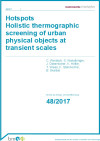
Die Projektidee verknüpft messtechnische Innovationen in der Erfassung und Generierung stadtbezogener Daten mit neuartigen Prozessketten in der Datenauswertung und Analyse. Auf Basis wissenschaftlicher Ansätze erarbeitet HOTSPOTS eine durchgängige Verfahrenskette die künftige Auswahlverfahren im Bereich von baulichen Maßnahmen der Stadtentwicklung auf eine nachvollziehbare und (mess-)datengetriebene Basis stellt, und somit das Risiko von ad-hoc Entscheidungen oder Fehlinvestitionen reduziert.
Schriftenreihe
48/2017
C. Windisch, S. Wakolbinger, J. Österreicher, K. Höfler, T. Weiss, K. Steinnocher, B. Skarbal
Herausgeber: BMVIT
Deutsch, 73 Seiten
Downloads zur Publikation
PV-Gemeinschaftsanlagen: Sondierung eines partizipativen Pilotprojekts mit Mehrwert in strukturschwachen Städten (MehrWertStrom 2030)
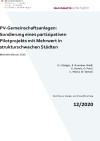
Das Projekt MehrWertStrom 2030 untersuchte die rechtliche, technische, organisatorische und wirtschaftliche Machbarkeit von PV-Gemeinschaftsanlagen auf Mehrparteienhäusern unter Bezugnahme der regionalen Wertschöpfung in strukturschwachen Regionen und erarbeitete neue Lösungsmodelle in Bezug auf Organisation, Finanzierung und Realisierung.
Schriftenreihe
12/2020
O. Schlager, R. Brandner-Weiß, G. Heneis, O. Percl, C. Plöchl, W. Wetzer
Deutsch, 69 Seiten
Downloads zur Publikation
Plug&Play Storage of Photovoltaic Power (P3Power)
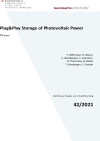
Im Projekt P³Power wird die Messtechnologie NetDetection (Abschätzung des Leistungsverbrauchs an einer Phase von einem beliebigen Messpunkt, z.B. einer Steckdose, in einem Haushalt) entwickelt. Auf Basis dieser Technologie werden plug&play Photovoltaik- und Speichersysteme realisiert, welche 100% Eigennutzung innerhalb beliebiger Aggregationsgrößen - vom Mehrfamilienhaus bis zur Gemeinde - ermöglichen ohne bestehende Installationen adaptieren zu müssen. Die Technologie wird digitalisiert, im Laborumfeld und in Realhaushalten getestet und zu einem umfassenden Energie-Service-Angebot weiterentwickelt.
Schriftenreihe
42/2021
Y. Wittmann, H. Bieser, S. Weinberger, C. Grimmer, B. Thormann, B. Böckl, T. Kienberger, V. Hacker
Herausgeber: BMK
Deutsch, 48 Seiten
Downloads zur Publikation
greening UP! Nachhaltige Grünpflege, Wartung, Instandhaltung von Vertikalbegrünungen inklusive rechtlicher Aspekte
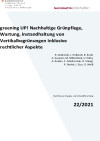
Im Projekt wurden aufbauend auf umfassenden Erhebungen und Analysen von bestehenden vertikalen Gebäudebegrünungen in Außenräumen (boden- und systemgebundene Fassadenbegrünungen) und vertikalen Innenraumbegrünungen passgenaue Grünpflege-, Wartungs- und Instandhaltungskonzepte erarbeitet und rechtliche Aspekte adressiert. Der "greening UP!"-Wissenspool mit konkreten Empfehlungen und anschaulich aufbereitetem Wissen sowie die Konzeption eines digitalen Tools zur "Ersten Grünen Hilfe" runden das Projekt ab.
Schriftenreihe
22/2021
R. Dopheide, J. Hollands, B. Knoll, A. Korjenic, M. Mitterböck, U. Pitha, A. Renkin, F. Schiefermair, R. Stangl, P. Skolek, I. Süss, O. Weiß
Herausgeber: BMK
Deutsch, 162 Seiten
Downloads zur Publikation
Repair & Do-It-Yourself Urbanism (R&DIY-U)
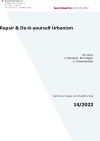
Das Projekt verfolgte die Zielsetzung, das transformative Potential des Repair & DIY-Urbanism zu stärken. Dies erfolgte im Hinblick auf eine grundlegende Umwandlung des vorhandenen wenig nachhaltigen Umgangs mit Gebrauchsgütern in konkreten Stadtbezirken, deren Infrastrukturen und dominante Wirtschafts- und Alltagspraktiken hin zu resilienten Stadtbezirken.
Schriftenreihe
14/2022
M. Jonas, S. Hassemer, M. Piringer, E. Schwarzlmüller
Herausgeber: BMK
Deutsch, 88 Seiten
Downloads zur Publikation
P2PQ - Peer2Peer im Quartier
Das Projekt Peer2Peer im Quartier befasst sich mit der konkreten Umsetzung von Anwendungen zu Photovoltaik-Eigenverbrauchsoptimierung sowie Peer-to-Peer-Beziehungen auf Basis der Blockchain-Technologie in Quartieren und deren Validierung im Echtbetrieb.
P2PQ - Peer2Peer im Quartier
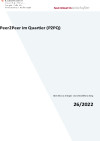
Das Projekt Peer2Peer im Quartier befasst sich mit der konkreten Umsetzung von Anwendungen zu Photovoltaik-Eigenverbrauchsoptimierung sowie Peer-to-Peer-Beziehungen auf Basis der Blockchain-Technologie in Quartieren und deren Validierung im Echtbetrieb.
Schriftenreihe
26/2022
Herausgeber: BMK
Deutsch, 43 Seiten
Downloads zur Publikation
50 green houses - Development and demonstration of a low-tech façade greening system
Development of a cost-efficient all-in façade greening system („Greening-Toolkit“) including a maintenance concept, involving all trades and processes, for a broad (facing roads) implementation on facades in the urban built environment, combined with a process innovation for simplification of all necessary coordination processes.
Repair & Do-It-Yourself Urbanism (R&DIY-U)
The project follows the aim to analyze and to strengthen the transformative potential of Repair & Do-It-Yourself Urbanism with regard to a fundamental change of the existing poor sustainable handling of commodities in selected urban districts, their infrastructures and dominant business and private household practices into resilient areas.
greening UP! Sustainable green maintenance, maintenance, maintenance of vertical greenery including legal aspects
Based on extensive surveys and analyses of existing vertical building greenery in outdoor areas (floor and system-bound façade greening) and vertical interior greenery, the project developed tailor-made green care, maintenance and repair concepts and addresses legal aspects. The "greening UP!" Knowledge pool with concrete recommendations and clearly presented findings as well as the conception of a digital tool for the "First Green Aid" complete the project.
LivingMODELofTomorrow
Development of transparent, technical and economic models for medium and high volume residential buildings, with special focus on the non-profit sector. Topics such as generation living, teleworking as well as smart homes are developed in an integrated model, for dense structures as well as pavillons and townhouses. All models follow the three pillars of sustainability.
StromBIZ - demonstration projects: business models for decentralized electricity generation and distribution
Feasible business models to utilize locally generated renewable energy are expected to induce a tipping point for the "Energy Turnaround" in Austria. Within the proposed project a number of demonstration PV plants on residential and non-residential buildings had been realized. On this basis new approaches of business cases had been developed, implemented, tested and disseminated.
Urban MoVe - Private law contracts as innovative instruments for city and mobility planning.
The research project Urban MoVe investigated to what extent private-law contracts (e.g. mobility contracts, funds, urban development contracts) are suitable as municipal planning and steering instruments for mobility at residential locations based on best practice analyzes and implemented national practical examples.
ÖKO-OPT-QUART - Economically optimized control and operating mode of complex energy networks of future city districts
In the project ÖKO-OPT-QUART energy-based, economic and control-orientated models will be developed in order to simulate the operating mode of complex, sustainable energy networks in city districts. For an exemplary configuration these models will be combined to an overall model which allows a realistic economic comparison of different control strategies. The final goal of the project is the development of a method for the systematic design of cost-optimized, predictive control strategies for complex energy networks in city districts.
Villab – Exploration of a Villach innovation laboratory for the cooperative development of sustainable neighbourhoods
The "Villab - Probe" project serves to check the feasibility of an urban innovation laboratory to accelerate the transformation of Villach districts towards climate neutrality. Assuming positive feasibility, the cooperation with relevant stakeholders will be deepened and a business plan drawn up for a future innovation laboratory.
PV4residents – Innovative Finance Service and Business Model for PV Power Plants of Multiple Dwellings with On-site Use of Electricity
The aim is to develop a business model, which enables a stronger penetration of PV plants on multiple dwellings with self-consumption of produced electricity by the residents. Involvement of the municipality allows to deliver surplus electricity for their needs. Basis of the business model is an analysis of the technical, legal, administrative, user related and economic barriers with participation of stakeholders and to identify best practice solutions.
Smart Pölten 2.0 Holistic view on a Vertical Farm in preparation for a demonstration project for the city of St. Pölten
The city of St. Pölten forsees great potential in Vertical Farming with regard to the objectives related to the concept of the Smart City program - linking local food production, quality of life by reducing resource consumption. This has to be evaluated by combining Vertical Farms with existing living buildings. Eco-social and socio-economic considerations play an important role in this process.
urban pv+geotherm - Innovative concepts for the supply of large volume buildings/ quarters with PV and geothermal energy
The use of renewable energies in inner city locations is mostly linked to higher costs andconsidered as problematic. The aim of this project was to optimize (cost and energy) heating (and where required, cooling) using geothermic and photovoltaic for an urban, densely-built development area. With the project´s findings it will be easier to ecologically and economically plan the use of renewable energies especially in urban areas.
CoolAIR - Predictive control of natural nighttime ventilation and daylight-optimized shading for passive building cooling
Natural nighttime ventilation and daylight-optimized shadowing are high potential approaches to efficiently and economical cool buildings. Nevertheless, the full potential cannot be acquired, since, if at all, such behavior is manually initiated by users. Goal of this project is the development of an automated, self-learning system that can assess the full cooling capabilities and establish an alternative to conventional air conditioning systems.
REC-Businesspark - Investigation of the first Austrian renewable energy community business and industrial park
In the course of the project, the conceptual design of a zero-emission or plus-energy business park in Weiz with a focus on photovoltaics and fuel cells in combination with a Renewable Energy Community (E-EGe) had been carried out. By establishing the park on a "greenfield", all structures can be created according to the requirements of the E-EGe.
